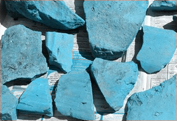|

Excavations were completed here earlier this month with two weeks of intense activity, culminating in an open day on the final Saturday. It turned out to be a very successful fortnight with hundreds of volunteers (both adults and school children) taking part.
Here are some of the statistics:
There were 225 day placements taken by the adult volunteers representing 91 individuals (of which 59 had never dug before). There were over 280 school children, from 11 different schools, spending half a day on the site, each taking part in excavation, geophysics and finds analysis. The children were mainly primary school age but one group was from a secondary school and one from the local 6th form college. There were also 14 students studying 'A' Archaeology from a college in Warrington, very grateful to get the opportunity for the practical experience. Most surprising of all was a group from the University of the 3rd Age (U3A) all the way from Lytham St Annes who had boundless energy and enthusiasm.
Etherstone Hall is first mentioned in the 14th century and was reported to have had a moat. These excavations however could only reveal evidence from the late 18th / early 19th century including the farmhouse and its outbuildings but there was also tantalising remains of the 'imposing new house' built by Thomas Jones in 1826. There were however some interesting finds. These included pieces from a child's 'Cat and Fiddle' plate and an almost complete saddle girth found in what is thought to be the stables.
This dig is the first in the Dig Greater Manchester series which will include digs at Radcliffe (in June) and Chadderton (in September). Brian Grimsditch and his team from the CfAA who organised and ran the event, are very pleased with the outcome and are looking forward to the next in the series. You can find out more information from the public forum on our website here.
Worsley Old Hall
If you want to get involved in a dig closer to home, the CfAA have been given the go ahead to undertake a community project at Worsley at the end of this month (23rd April until 17th June). It will also include some Saturday working and this time volunteers can register for as many days as they want (although places are limited). If you are interested contact Brian Grimsditch direct on B.Grimsditch@salford.ac.uk or Tel: 0161295 3821 for more details.
New Archaeological Service
Last month I reported the winding up of the GMAU with no apparent arrangement for its replacement. I can now announce that a new archaeological service has been agreed on (in principle anyway). Details have yet to be sorted but it will, as expected, be hosted by the CfAA at Salford University. This is great news for Norman Redhead and his team, most of whom will be retained (due to personal reasons, sadly Peter Leeming will not be joining the new setup). The purpose of the new service will primarily be to advise on planning applications in archaeologically sensitive areas. However it will operate on a much reduced remit, relying heavily on the local council planners to identify areas to be reported. It has been suggested that local societies could help prevent sites slipping through the net by scanning through applications published on the council's website.
Next Meeting
Wednesday 4th April - at our new venue, the Standish Suit at the Brocket Arms (7.30pm as usual). Last month's meeting went very well there but there was an issue with the car park. If it gets full, however, there is parking in front of the shops opposite and along Swinley Lane.
This month we have Mark Gaskell, a local military historian, who will be telling us about 2nd World War Anti-invasion plans for the Wigan area (many features still survive in the landscape). Mark also helped with the Time Team project which excavated the American Bomber that crashed in the marshes of the Ribble estuary. Hope to see you there, - BA
Commemorating Ben Edwards
On Saturday 9th June, the Centre for NW Regional Studies will be holding a special Study Day in honour of Ben Edwards who died in February last year. Ben was held in high esteem amongst his peers, historians and archaeologist alike. The day will celebrate his life with a series of talks on a variety of subjects ranging from the Romans in the Fylde to 19th century coal mining in the West Pennine Moors. It will be chaired by his friend and colleague Professor David Shotter, and will be held in the Faraday Lecture Theatre at Lancaster University. If you are interested, you will need to book in advance - contact me at the meeting for a booking form.
|



